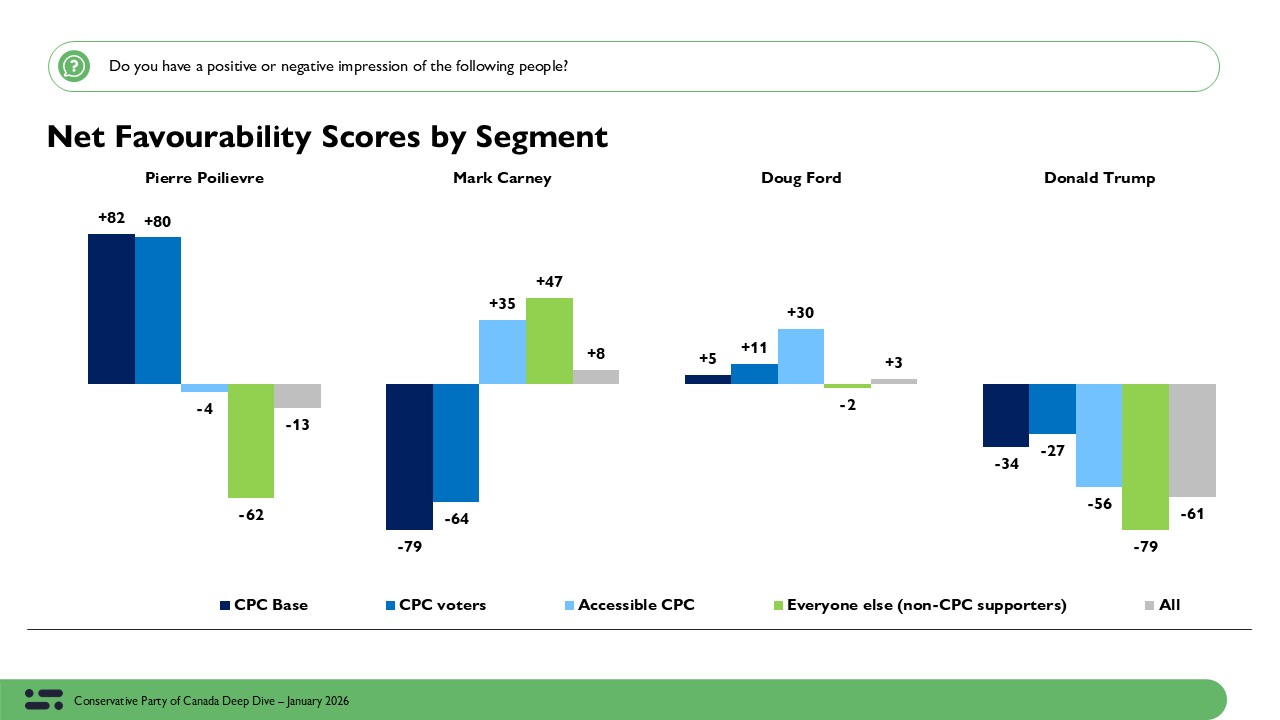What Happens to the Conservative Party Without Pierre Poilievre? Canadians Weigh In on Potential Leadership Alternatives
November 8, 2025
Leadership hypotheticals are always speculative, but they’re not pointless. Political leadership is about more than brand management or media presence, it’s the centre of the coalition, the public face of a movement, and often the determining factor in voting behaviour.
That’s why we conducted a survey of 2,922 Canadian adults between October 24 and 29, 2025, for the Toronto Star, exploring what might happen if Pierre Poilievre were no longer leading the federal Conservative Party. Would voters be more or less inclined to support the party? Are there other Conservative figures who might perform better in an election? And what does all this say about the shape and limits of the Conservative coalition today?
It’s important to note that this poll was conducted prior to the events of budget week, during which one Conservative MP crossed the floor to the Liberals and another announced his resignation from Parliament. These developments may alter the dynamics we capture here, but they also make this snapshot even more relevant. At a time when party cohesion is under scrutiny and political leadership is under pressure, understanding the relative strength of Pierre Poilievre and his possible successors is timely.
This exercise is not a prediction. Poilievre has given no indication that he plans to step aside. But it does offer a useful benchmark: it tells us what Canadians think of key Conservative names, and what happens to the party’s support when someone else is placed at the helm.
Canadians Are Split on Poilievre, But He Anchors His Party’s Base
Pierre Poilievre’s public image is defined by polarity. Among all Canadians at the time of this survey, 43% hold a positive view of him while 46% view him negatively, leaving him with a net favourable rating of –3. But that average masks deep variation across partisan, regional, and demographic lines.
Among Conservative voters in 2025, Poilievre’s net score is a towering +70, a sign that he isn’t just tolerated by his party’s base but embraced. Among Canadians who are open to voting Conservative, his net rating is +59. Even among those not yet committed to the party, he is seen more favourably than not, though with some hesitation built in.
Regionally, his support is strongest in Alberta (+19) and Saskatchewan/Manitoba (+11), but weakest in Quebec (–25). Older voters are especially wary: among those 60 and over, Poilievre’s net score is –23. By contrast, voters under 60 tend to view him more favourably or are at least divided.
These numbers confirm a simple truth: Poilievre defines the current Conservative brand, for better or worse.

What If He Stepped Aside?
When asked how they would feel about the Conservative Party if someone else were leader, 29% of Canadians said they would be more likely to vote Conservative, compared with 12% who said less likely. Nearly half — 46% — said it would make no difference.

That 17-point “more likely” margin is striking. It suggests a theoretical opportunity for the party to expand its support under a different leader. But it’s also a cautionary note: Poilievre may repel some voters, but he mobilizes many others. That dynamic is hard to replicate.
Among 2025 Conservative voters, 58% say they’d be just as likely to vote for the party without him. But about 10% say they’d be less likely to do so, suggesting a portion of the party’s vote is more Poilievre than Conservative.

Among the broader accessible pool of Conservative supporters, 29% say they would be more likely to vote Conservative if Poilievre were not leader. That’s the number that might tempt some strategists to wonder about change. But a generic response to a hypothetical question is one thing. Real electoral scenarios are another.
When Real Names Replace the Hypothetical
To move beyond theory, we tested a range of potential Conservative leaders. These included some with strong national profiles — like Stephen Harper and Doug Ford — and others who are newer or lesser known, such as Melissa Lantsman and Jamil Javani. Each was placed in a hypothetical ballot test alongside the Liberals under Mark Carney, the NDP under a future leader, and the Bloc Québécois under Yves-François Blanchet.
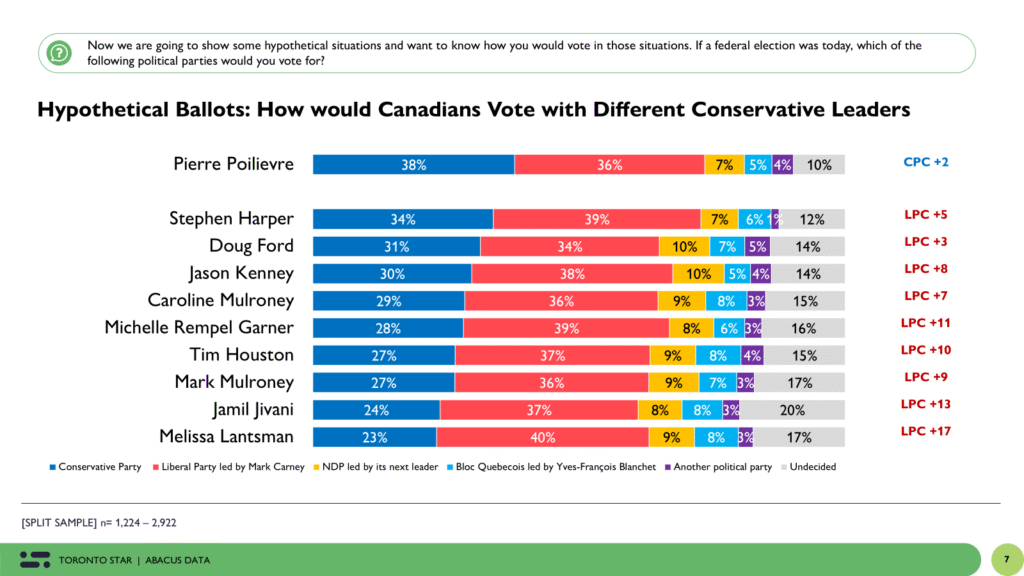
Here’s what we found:
Pierre Poilievre remains the strongest option. With him as leader, the Conservatives secure 38% of the vote, narrowly ahead of the Carney-led Liberals at 36%.
Stephen Harper polls at 34% — a four-point drop from Poilievre — despite being the most well-known and best-liked name tested (net favourability +11). His appeal skews older and is strongest in Alberta but doesn’t translate into a stronger national showing.

Doug Ford, Ontario’s premier, draws 31% of the national vote. Although his net favourability is positive (+6), 31% of past Conservative voters say they’d be undecided or support another party under his leadership. In Ontario, Ford would trail Carney’s Liberals by four points.

Jason Kenney, former Alberta premier and Conservative cabinet minister, earns 30%. His overall impressions are mildly negative (–3), and his hypothetical performance is eight points below Poilievre. Support among former Conservative voters also softens.

Caroline Mulroney performs similarly to Kenney, attracting 29%. She holds a mildly positive favourability rating (+6) but lacks intensity or name recognition outside of Ontario or Quebec. About 17% of past Conservative supporters say they would be undecided under her leadership.
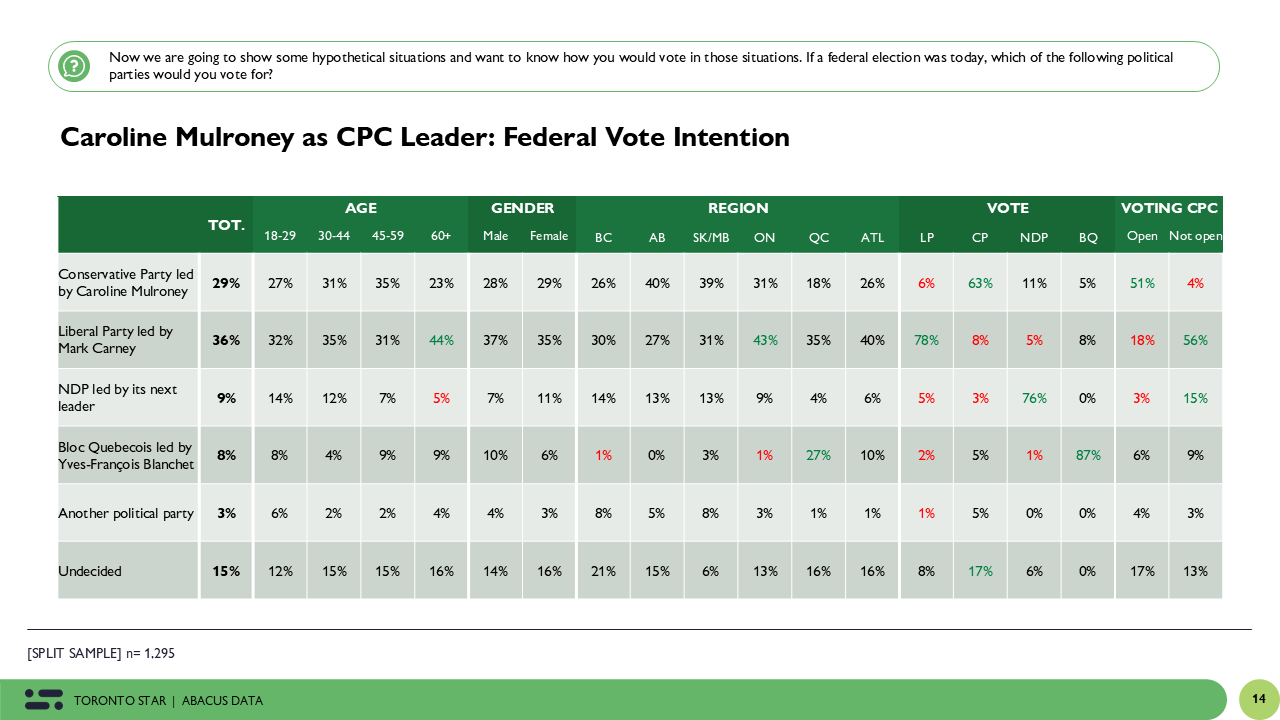
Michelle Rempel Garner scores 28% nationally, with a net favourability of +4. Half of Canadians say they don’t know enough about her to have an opinion. Even among past Conservative voters, her support base is more hesitant than with Poilievre or Harper.
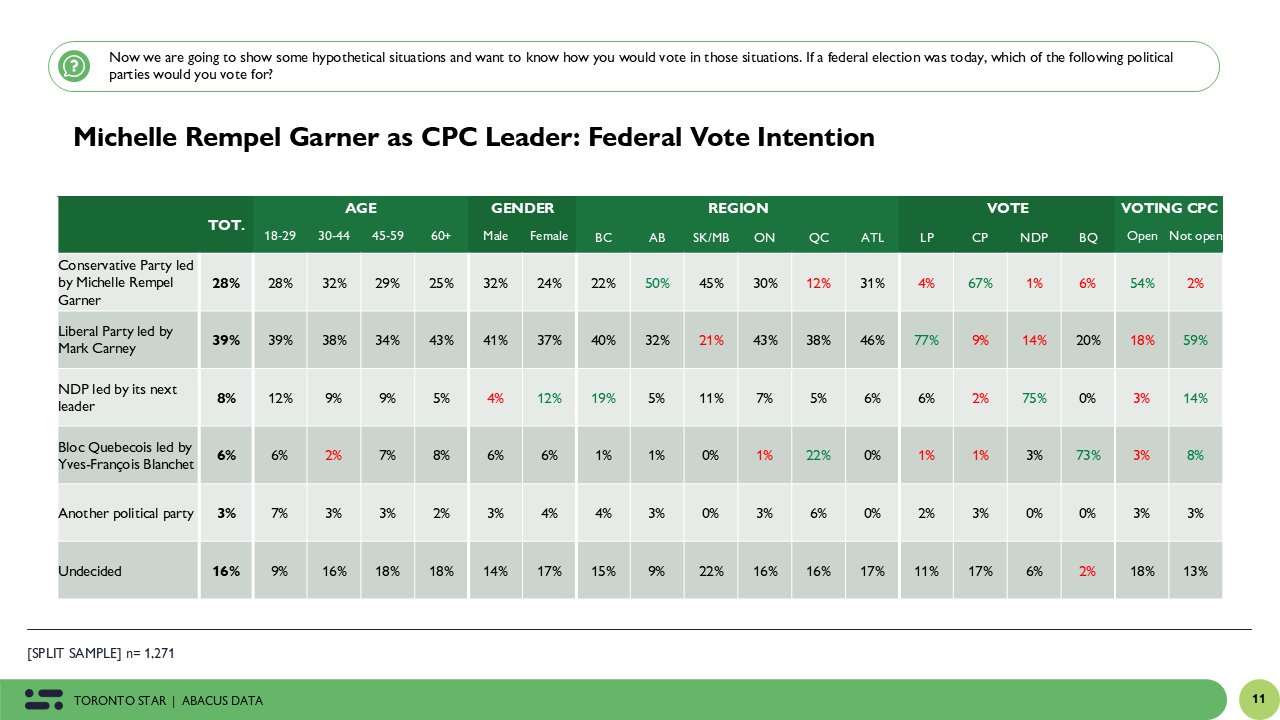
Nova Scotia Premier Tim Houston (27%) and business person Mark Mulroney (27%) perform at nearly identical levels. Both have relatively low national profiles. Houston has a slightly higher favourability score (+8), but that’s largely concentrated in Atlantic Canada.

Jamil Jivani, a first-term MP, garners 24%. He’s viewed neutrally and remains largely undefined in the eyes of voters. Among young men, however, his numbers are comparatively stronger, suggesting early-stage potential but limited reach today.

Melissa Lantsman brings in just 23% of the vote. Despite a growing media profile and a positive favourability rating (+6), 45% of past Conservative voters say they would either vote elsewhere or are unsure if she led the party. Just 2% of past Liberal voters would switch under her leadership.
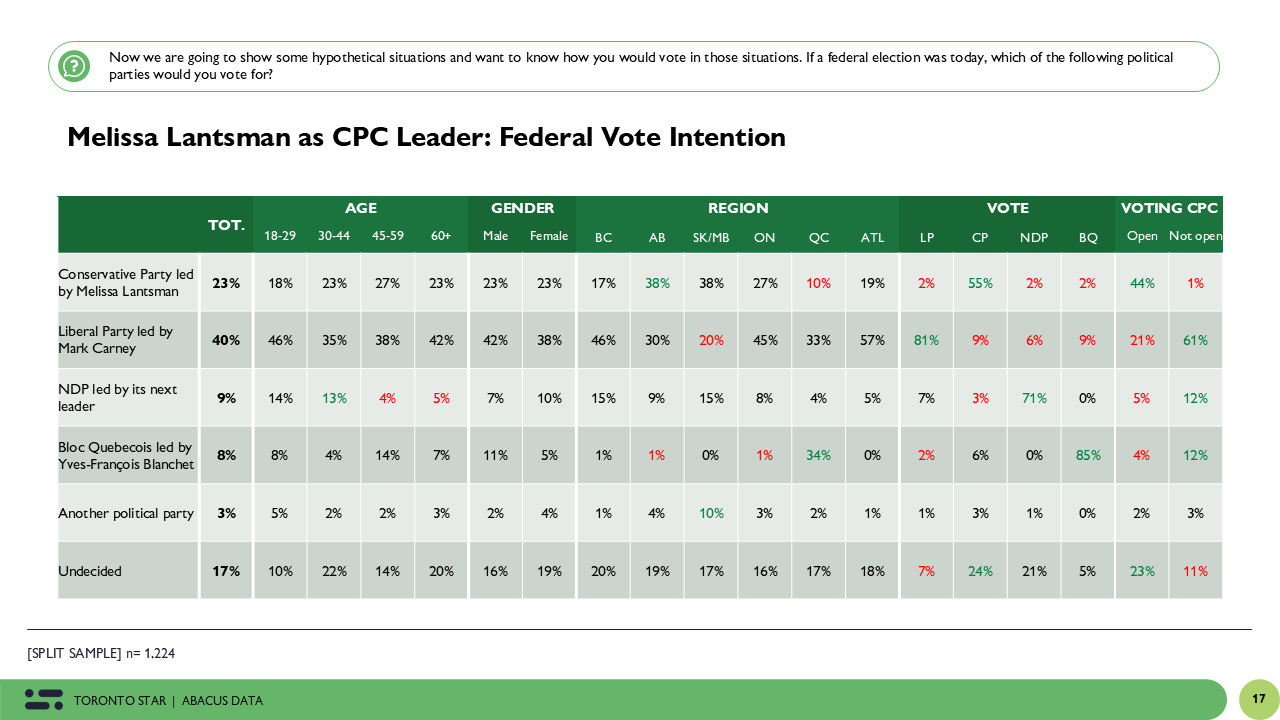
A Pattern Emerges: Recognition Drives Results
Across all these scenarios, one theme stands out. Leaders who are well known perform better but not necessarily better than Poilievre. And those who are lesser known suffer from steep drops in support, even when their personal images are relatively positive.
In Poilievre’s case, definition is everything. His image may divide voters, but it also crystallizes the Conservative identity. It gives potential supporters a clear idea of what they’re buying. By contrast, candidates like Houston, Mulroney, Lantsman, and Jivani see undecided rates spike dramatically, often reaching 15 to 20%, compared with just 10% under Poilievre.
The issue isn’t necessarily that Canadians dislike the alternatives. In many cases, they just don’t know them. And when voters don’t know a leader, they default to caution, not curiosity.
The Liberal Factor: Carney’s Consistent Strength
In every hypothetical match-up, the Liberals under Mark Carney perform consistently in the mid to high 30s, whether the Conservatives are led by Poilievre, Harper, or Javani. In fact, in nine of the ten match-ups, the Liberals would finish ahead – except in the match up with Poilievre.
That stability underscores Carney’s own appeal, but it also highlights a deeper dynamic. The current Liberal base isn’t especially reactive to changes in Conservative leadership. Replacing Poilievre doesn’t cause Liberal support to collapse. If anything, it often strengthens it.
In part, that may reflect Poilievre’s success in energizing his own base while drawing intense opposition. His removal may soften that pushback, but it also dulls the contrast that defines the political choice for many voters.
The Upshot
This survey doesn’t suggest that Pierre Poilievre is irreplaceable. But it does show that no other current Conservative figure performs better today and most would do worse.
Poilievre’s brand carries both upside and risk. He is not universally liked, but he is vividly defined. And in the absence of a national figure who combines charisma, clarity, and cross-partisan appeal, the party’s best-performing option remains its current leader.
It’s possible that some of the lesser-known figures in our survey will grow into leadership contenders with broader appeal. But for now, their potential is speculative, while Poilievre’s performance is proven.
The Conservatives face a familiar political trade-off: stick with a polarizing figure who drives turnout and energizes the base, or gamble on a fresh face who may not be ready for prime time or cause a portion of the exist base to exit the Conservative tent or just not vote at all. For now, the data suggest that the party’s ceiling and floor are both tied closely to Poilievre. Without him, the base may mostly stay intact, but the reach would not automatically expand.
Methodology
The survey was conducted with 2,922 Canadian adults from October 24 to 29, 2025. A random sample of panelists was invited to complete the survey from a set of partner panels based on the Lucid exchange platform. These partners are typically double opt-in survey panels, blended to manage out potential skews in the data from a single source.
The margin of error for a comparable probability-based random sample of the same size is ±1.8%, 19 times out of 20.
The data were weighted according to census data to ensure that the sample matched Canada’s population according to age, gender, and region. Totals may not add up to 100 due to rounding.
About Abacus Data
We are Canada’s most sought-after, influential, and impactful polling and market research firm. We are hired by many of North America’s most respected and influential brands and organizations.
We use the latest technology, sound science, and deep experience to generate top-flight research-based advice to our clients. We offer global research capacity with a strong focus on customer service, attention to detail, and exceptional value.
And we are growing throughout all parts of Canada and the United States and have capacity for new clients who want high quality research insights with enlightened hospitality.
Our record speaks for itself: we were one of the most accurate pollsters conducting research during the 2025 Canadian election following up on our outstanding record in the 2021, 2019, 2015, and 2011 federal elections.
Contact us with any questions.
Find out more about how we can help your organization by downloading our corporate profile and service offering.


